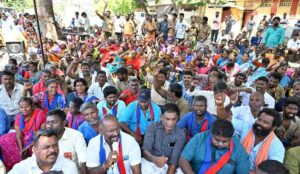Politics
20 Days of Resilience: Retired Transport Workers in Madurai Demand Justice and Dignity

For the past 20 days, a group of retired transport employees in Madurai has been staging a determined protest, bringing attention to long-standing grievances over delayed benefits and unfulfilled promises. Organized under the Tamil Nadu State Transport Retired Employees Welfare Association, nearly 150 retired staff have gathered daily, demanding their rightful dues—ranging from provident fund settlements to gratuity and leave encashment.
Unpaid Dues: A Struggle for Years
Several of these retirees allege that despite completing decades of service, they have yet to receive the financial settlements that are due to them. Some claim they have been waiting since June 2023 for basic entitlements such as gratuity, provident fund contributions, and leave encashment. For many, these delayed payments have disrupted household budgets and strained their ability to meet essential expenses, including medical costs.
The Pension Question
One of the most contentious issues fueling the protest is the demand for restoration of the old pension scheme. Employees who joined the transport corporations after April 1, 2003, were placed under the New Pension Scheme (NPS). Protesters argue that those who dedicated their careers to a public service sector deserve the security of a fixed pension. They emphasize that a guaranteed income in retirement is not just financial relief but also a matter of dignity and social security.
Medical Insurance and Welfare Concerns
Apart from pensions and dues, retirees have also raised concerns about medical insurance benefits. They seek parity with serving employees, arguing that healthcare costs for the elderly are significantly higher and that the current scheme inadequately covers their needs. For many retired staff, whose health expenses rise with age, this remains a pressing issue.
Voices from the Protest
At the sit-in site in Madurai, protestors have shared personal stories of hardship. A 68-year-old former bus driver explained how the delay in gratuity payments has forced him to depend on his children for daily needs. A retired conductor expressed frustration that decades of dedicated service to the state transport system have not translated into security in his old age.
The emotional appeal of these stories underscores the urgency of their demands. Beyond financial concerns, the protestors are asking for acknowledgment of their contribution to Tamil Nadu’s extensive public transport network, which has long been considered the backbone of mobility for common citizens.
Government’s Response So Far
The association’s representatives met with the Transport Minister in Chennai last month, but talks have so far yielded little progress. Officials have assured that steps are being taken to address the grievances, yet no concrete timelines have been provided. This uncertainty has further fueled frustration among the retirees.
Observers note that the issue also ties into broader financial challenges faced by the state transport corporations, many of which are struggling with debts and operational deficits. While the government continues to announce welfare measures for active employees and the general public, retirees fear they are being left behind.
Broader Implications
This protest is not an isolated event. Across India, similar movements by retired government and public-sector employees are highlighting the tension between fiscal management and social responsibility. The Madurai protest reflects a deeper debate about how states balance economic priorities with welfare obligations, especially toward those who built the system over decades of service.
Social activists have pointed out that ignoring the demands of retirees risks creating a generation of senior citizens facing financial insecurity. They argue that pension reform, timely settlements, and adequate medical support are not just benefits but rights owed to public servants.
What Lies Ahead?
As the protest crosses its 20th day, the resilience of these retired employees suggests that the movement is unlikely to fade soon. With elections approaching in the next few years, political parties may be forced to address these concerns more directly. Already, opposition leaders have begun expressing solidarity, framing the issue as one of respect and dignity for senior citizens who kept the wheels of Tamil Nadu’s transport system running.
Until then, the retirees continue to gather each day, their placards and voices echoing a simple demand: justice for those who served.







